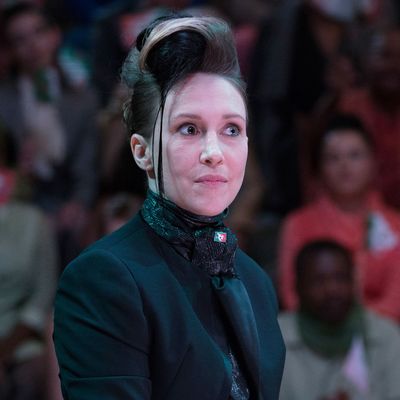
The thing I’ve come to like best about Electric Dreams is how every episode is completely different. Not just in terms of conceit, but voice, strengths, flaws, and even basic approach. Ultimately, it seems that Philip K. Dick’s name was crammed into the title as a selling point, while each episode took the loose framework of his stories to make something new. I have a feeling hardcore fans of his work will be disappointed about that choice, but I’m ecstatic about it — and not just because slavishly adapting work written in the ’50s and ’60s can be problematic. Every time I started an episode, I had no idea what I was going to get. I’ve genuinely come to love that surprise element, even if the number of misses in this hit-and-miss anthology series is much higher than the number of hits. But with that, I’m sad to report that we unfortunately end the season on a miss.
“Kill All Others” is a simple parable about our modern slide into fascist hate speech, as well as the emotional cost it takes on those who refuse to shrug it off. I was incredibly excited to see this episode, as it was written and directed by Dee Rees (Pariah, Mudbound), whose raw, realist work deserves endless eyeballs. But it suffers the same fate of a lot of sci-fi: It’s stuck in a kind of no-man’s land. It’s not funny or scathing enough to be satire, nor is it emotionally grounded enough to be moving. Which means it coasts along the surface when it should cut to the bone.
On the other hand, the episode does feature a performance by Mel Rodriguez, a great character actor who you may recognize from Last Man on Earth and Better Call Saul. He plays Philbert Noyce, a quality-control factory worker who both oozes decency and can’t stomach the hate speech being offered up by a presidential candidate (Vera Farmiga). The key word here being “candidate” — as in singular, implying that America has slid into a one-party system.
That is something I have questions about, because I genuinely can’t tell what Rees is after here. Is she suggesting that our two-party system is an inherently limited spectrum? That both parties evoke the same nationalist fervor? By including the very overt language of “Yes, us can!” is the episode casting the Obama administration into that same bucket? Or is this all just an allegory about how America could easily get overtaken by an authoritarian dictator and most citizens wouldn’t notice? If “Kill All Others” wants to take on life under a police state, I didn’t see nearly enough to support that idea. I just can’t tell what all these cultural touchstones are meant to add up to.
But as much as I’m at a loss in trying to decipher the episode’s take on modern politics, it’s much more clear with regards to the feeling underneath it. Noyce’s experience is an obvious parable to living in the Trump era: Every day presents another gross affront to humanity, an outrage so justifiable as to be sickening. And yet, people just want to go on with their lives. They shrug it off as usual politics, except it’s not. “Kill All Others” is strongest whenever it pivots to this chilling idea, as Noyce starts doubting his own sanity simply because nobody else seems to care.
To which I can’t help but think back to Philip K. Dick’s original story, “The Hanging Stranger,” in which this was all a clear parallel to lynchings in the South. It spoke to a time when white society merely shrugged about a black person being hanged, when America would act like such a murder was acceptable. So, why doesn’t Rees make that parallel directly? Is it because sci-fi always tends toward metaphor? Well, that question brings us to the matter of authorship and identity: An artist who makes a film like Mudbound clearly has a deep understanding of America’s cruel racial history. Rees knows the history of “strange fruit” all too well, and she know what it’s like to be othered in more ways than one, so it’s especially important that “Kill All Others” offers us the language of inclusion. Rees is bringing us into the larger truth of reflexivity and the minority experience in a way that is genuine. Which means that at the core, the biggest message of the episode is one that rings most true.
Which is why it stinks that the episode suffers from three big problems. The first is the aforementioned issue of tone. The second is a broader problem with its use of paranoia: As Noyce’s life spins out of control, he does out-of-character things like punching his wife and immediately fretting before he becomes a puppet of the state. (There’s too much “Safe and Sound” here for comfort.) The last problem, and perhaps the biggest, is that Noyce’s struggle develops in a dramatically static way. Even as the intensity builds, we essentially see the same conflict over and over.
Which brings us to the soul-crushing crux of it all: The storytelling of “Kill All Others” faces the same problem that we face every day. For when it comes to the monotonous nature of Trumpian outrage and horrors, the ugliest truths can stare us right in the face again and again and again, and what if they don’t evolve or form some grander narrative? Then we react with boredom or escalate to anger, because we simply aren’t emotionally equipped to handle that monotony. Just like we can’t handle monotony in a story itself. Perhaps this is a crushing meta-truth that Rees intended, but the problem with politics and drama remains: In the end, you still gotta move the audience.

